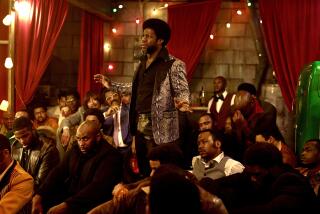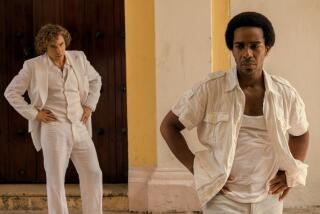Review: ‘Judas and the Black Messiah’ gives the Black Panthers a searingly powerful close-up
The Times is committed to reviewing theatrical film releases during the COVID-19 pandemic. Because moviegoing carries risks during this time, we remind readers to follow health and safety guidelines as outlined by the Centers for Disease Control and Prevention and local health officials.
In the coolly electrifying “Judas and the Black Messiah,” you can’t take your eyes off Daniel Kaluuya as Fred Hampton, the Black Panther Party leader who would become a 21-year-old martyr and revolutionary icon. One of the achievements of this movie, an expansive yet intimate chronicle of the events leading up to Hampton’s 1969 killing during a police raid on his Chicago apartment, is that it restores the man, for two hours at least, to some dramatic semblance of his former glory. Memorialized for his tragic death, he is reclaimed here as a figure of boisterous, defiantly big-hearted life.
Kaluuya (Oscar nominated for “Get Out”), an actor of boundless charisma and versatility, reveals the same qualities in Hampton himself. As chairman of the Black Panthers’ Illinois chapter, he is the target of much hateful scrutiny from J. Edgar Hoover (a scowling Martin Sheen), who’s shown directing his FBI underlings to take action against this potential “Black Messiah” and the various subversives he is bound to inspire. You can see why Hoover’s so rattled: The Fred Hampton we meet is a born activist, a master orator and a ferocious critic of the white power structure. He urges his fellow Panthers to embrace socialism, practice militancy and reject any culture — even traditional African culture — that might tempt them from the path of revolution.
But Fred is many other things too: an educator of young children, feeding their bellies and minds through local breakfast programs, and a builder of diverse coalitions, forging unlikely bonds with Black, Latino and white activists across one of America’s most segregated cities. He is a cynic and an idealist, a dreamer and a doer, and a hell of a stylist, rocking a corduroy blazer in a sea of berets and black leather jackets (the work of costume designer Charlese Antoinette Jones). He has a tactician’s understanding of war but proves touchingly shy in matters of love, as observed by his fellow Panther and girlfriend, Deborah Jones (Dominique Fishback), in a flirtation scene that begins with a dual Malcolm X recitation and ends with the sweetest of kisses.
Fred, in short, is almost too singular and overwhelming a presence to be contained by this big, sweeping but inevitably circumscribed movie, which has to thread a needle not uncommon to biographical dramas of its sort. Directed with bristling energy by Shaka King, who wrote the script with Will Berson (from a story by Keith and Kenny Lucas), it makes the most of its narrative economy, using a focused time frame to illuminate broader patterns of historical meaning. As reinforced by every capacious widescreen frame of Sean Bobbitt’s cinematography, the movie is both a portrait and a panorama, a story about Black self-determination as an individual and collective enterprise.
It also occupies a unique place in the annals of cinema devoted to the history of the civil rights movement and its place within the larger counterculture of the 1960s. Notwithstanding the recent “The Trial of the Chicago 7” (in which Hampton and his famous comrade Bobby Seale both have roles), the relative dearth of Hollywood movies about the Black Panther Party for Self-Defense presents King with both a challenge and an opportunity. Given the American film industry’s long-standing preference for reassuring, white-centered narratives of racial justice, it’s no small thing to see a major studio release place the grass-roots activism and political spectacle of the Black Panthers center-frame — a task that until now has largely been the domain of nonfiction works. (The most salient of these might be 1971s “The Murder of Fred Hampton,” which made the case early on that Hampton was assassinated as part of a larger conspiracy.)
Perhaps slyly acknowledging this debt to documentary cinema, “Judas and the Black Messiah” opens with mock footage of William O’Neal (LaKeith Stanfield), a petty crook turned paid FBI informant, being interviewed in 1989 for the film “Eyes on the Prize II.” Even for those unaware of the events he’s about to relate, something in Stanfield’s eyes, so good at projecting unease, immediately identifies William as the Judas of the title. Soon the story flashes back to a Chicago night in 1968, when he is arrested for car theft — a crime he notably commits not with a weapon but with a fake FBI badge. His skill at impersonation thus established, he is enlisted by a real federal agent, Roy Martin Mitchell (Jesse Plemons, smug yet unsettlingly personable), to infiltrate the Panthers and help bring Hampton down.
William, whose mysterious back story and fierce reflexes earn him the nickname “Wild Bill,” thus plays a role familiar from many films about movements and organizations: the outsider who becomes the audience’s point of narrative entry. It’s through his conflicted vantage that we get to know Fred and other party comrades, some of them fictional or composite characters, and nearly all of them destined to make painful sacrifices for the cause. (They’re vividly played by actors including Ashton Sanders, Algee Smith and Dominique Thorne.) We also encounter real-life Panthers like Bobby Rush (Darrell Britt-Gibson), co-founder of the Illinois chapter, and Mark Clark (Jermaine Fowler), who would meet his own end in the raid on Hampton’s apartment.
A wide range of narrative and documentaries highlights to watch for at the first virtual Sundance Film Festival.
One brutal but mercifully undepicted episode — the torture and murder of Alex Rackley, a New York Panther suspected of being a police informant — raises the stakes dramatically for Bill, who lives in fear of what his comrades might do if they discovered the mole in their midst. He is, by his own admission, a model spy: a man who thinks fast and acts faster, with no apparent political allegiances or personal investment in civil rights struggles, as he reassures Mitchell early on. But “Judas and the Black Messiah” knows how close the political and the personal can be, and it doesn’t take Bill long to suspect that Mitchell’s line about the Panthers — namely, that they are as violent, extremist and morally indefensible as the Ku Klux Klan — might be a lie concocted to secure his loyalty.
Some of the movie’s most gripping moments arise when we see that loyalty begin to weaken, especially in the heat of an explosive Panthers-versus-police standoff that underscores the movie’s stylistic debt to some of the great American crime pictures of the ’70s (and shows King’s skill at reproducing their coiled, street-level intensity). When Fred’s temporary absence forces Bill to take on a larger organizational role, his true allegiance becomes even harder to determine: As Mitchell notes wryly after seeing Bill pump his fist at a Panthers meeting, either he’s joined the other side or he deserves an Academy Award. That’s quite a claim (and a loaded one to drop in the thick of Oscar season), but Stanfield’s performance is indeed a thing of insidious beauty, as conscience and cowardice duke it out until the cruel, bloody end.
The centrality of Bill’s perspective, forcing us to witness these tragic events through treacherous eyes, has the effect of tilting the movie even further away from simplified Hollywood uplift, casting the entire story in troubling shades of gray. There is nothing defensible or morally ambiguous about the FBI’s campaign, which is steeped in levels of racism so virulent that even Mitchell at one point is shocked to the core. But the acts of violence we see the Panthers commit in retaliation and self-defense are presented with cold, matter-of-fact precision: None of it is rationalized, condemned or romanticized. The logistical confusion that sometimes besets the narrative, splintering outward even as it barrels toward its grim conclusion, is matched by creeping undercurrents of doubt and anxiety at every turn.
And no one articulates that doubt with more authority and emotion than Deborah, who will one day be known as the activist Akua Njeri, and who is played with aching delicacy by Fishback. She finds solace in the poetry she writes and in Fred’s arms, even as she slowly makes peace with their place in a movement that will likely bring them grief and ruin. The long, difficult history of Black protest and progress has taught them as much.
And in its finest moments, “Judas and the Black Messiah” suggests the beginnings of a fresh cinematic reckoning with that history, buoyed by its own richly collaborative spirit. To watch it is to be reminded, almost subliminally, of Hollywood antecedents as different and daring as “Get Out,” in which Kaluuya and Stanfield shared a few particularly unnerving scenes, and the Marvel superhero epic “Black Panther,” which featured Kaluuya in a brief role and was directed by Ryan Coogler (one of this movie’s producers). And like the recent “Ma Rainey’s Black Bottom” and “One Night in Miami,” though it presents a more violent, despairing vision than either, it puzzles over the question of Black liberation with a seriousness that ties its 20th-century narrative to the racial and political convulsions of the present.
To call it timely would be both accurate and essentially meaningless, insofar as everything the movie shows us — the destruction of Black lives, the corruption of America’s institutions, the wounds and scars of a nation divided — has been with us, and may be with us, for a very long time. “Judas and the Black Messiah” is too honest to offer reassurances or solutions, but if nothing else, its tribute to Fred Hampton does warrant the final word: “America’s on fire right now, and until that fire is extinguished, don’t nothing else mean a damn thing.”
‘Judas and the Black Messiah’
Running time: 2 hours, 6 minutes
Rated: R, for violence and pervasive language
Playing: Starts Feb. 12 in limited release where theaters are open and streaming on HBO Max.
More to Read
Only good movies
Get the Indie Focus newsletter, Mark Olsen's weekly guide to the world of cinema.
You may occasionally receive promotional content from the Los Angeles Times.














